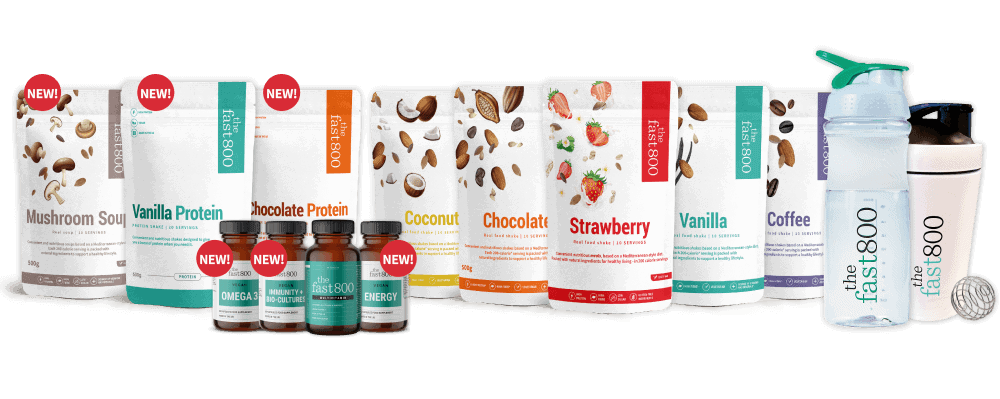Eat smart to beat hunger: how to feel fuller for longer
Losing weight shouldn’t be about losing out: meals should satisfy. We looked at the science to show you how to feel fuller for longer
Civilisation, as the saying goes, is only two meals away from anarchy. Feeling hungry is one of the most powerful stressors that exists – no wonder so many people don’t make it past the first few weeks on a diet. Knowing how to feel fuller for longer is essential to successful weight loss. To help you stay on track, we’ve rounded up the research to give you a three-step guide.
Step one: the three Fs
Fluid
Did you know that many of us are walking around in a constant state of dehydration, totally unaware of the health risk being dehydrated poses. When you’re not getting enough water, you’ll be sluggish, lethargic, and most likely mistake thirst for hunger.
Drinking plenty of water can help you feel fuller for longer, so make sure you stay hydrated.
Fat
We’ve been told all our lives to avoid fat. In response, the food industry has offered a range of sugar-laden low-fat “diet” foods; obesity rates, meanwhile, continue to soar. But far from being a cause of weight gain, “good” fats – rich in mono-and polyunsaturates – powerfully curb the appetite, slowing the rate at which the stomach empties and so delaying the point at which it signals for more food. To feel fuller for longer, select olive oil, nuts, oily fish and (in moderation) full fat-dairy products.
Fibre
The more fibre you eat, the happier your gut will be. Fibre promotes a better gut microbiome, increasing the levels of good-mood chemicals that are picked up by your brain. In addition, fibre induces release of a chemical called “PYY” which reduces appetite. To feel fuller for longer, then, pile your plate with fresh vegetables (especially greens), unprocessed grains and legumes.
Step two: eat more protein, and eat it first
It is well known that moderately increasing the amount of protein in your diet can help you to feel more satisfied after meals. What is less well known, though, is that the time of day that you eat protein also matters.
To test whether protein at the first meal of the day could help people to feel fuller for longer, a US-based study in 2014 divided volunteers into three groups. One group ate a breakfast containing 35g of protein; the second group ate breakfast containing 13g protein; the third group, meanwhile, skipped breakfast altogether. Later on that morning, the volunteers were tested for levels of dopamine, the chemical that drives our reward circuits. They were also asked to rate the intensity of their pre-lunch food cravings.
The results were clear: of all groups, the high-protein breakfast group recorded the highest dopamine levels and lowest pre-lunch food cravings.
Eating protein at the first meal of the day helps you to feel fuller for longer because after a protein meal, levels of a chemical called tyrosine – a building-block for dopamine – rise inside the brain. By increasing its own dopamine supply as the next meal approaches, the brain experiences a much weaker dopamine “hit” from high-calorie food.
This does not, of course, mean that you have to eat breakfast early in the day. For many, a midday “breakfast” helps to extend the period of non-eating and so draws down the full benefits of fasting. But what it does mean is that when you do break your fast, eating a higher-protein meal will help to stave off sugar cravings later on.
Step three: avoid trap foods
Have you ever wondered why it is so hard, once you have started eating junk food, to stop? Just as the right foods help you to feel fuller for longer, the wrong foods can do the exact reverse, throwing our brains into a cascade of craving.
Abundant, energy-dense, hyper-palatable foods are an incredibly recent arrival in our food environment. In 3 million years of human evolution, nothing has prepared us for it. In consequence, our brains are completely unequipped to cope with the intense reward that such food delivers, and switch to “more and more” mode after the first bite, especially if we take that bite when we are hungry. Junk food is trap food, designed to make you lose money and gain pounds. As a guide, the more aggressively it is advertised, the worse it probably is for you.
If you want to feel fuller for longer, keep away from it. When you’re out and about, bring a packed lunch; likewise, if you have to keep a stock of high-calorie snacks in the house for children, keep it locked up and away from the kitchen.
To feel fuller for longer, then, take a few simple steps – choose more of the right foods – especially good fats and fibre – avoid the wrong foods, eat protein, and eat it early. Like happiness, fullness really is a gut feeling.
Our environment pushes us towards obesity; science can pull us back. At The Fast 800, we are passionate about turning the latest research in nutrition, fitness and wellbeing into practical advice that works in the real world. By following our week-by-week, mentored and peer-supported programme for weight loss, more and more people are achieving results they never thought possible. Interested? Find out more!









